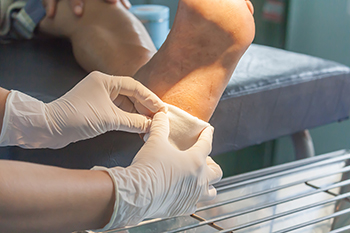
Puncture wounds to the foot can occur from various sources, often resulting in pain and potential complications. Common causes include stepping on sharp objects like nails, glass, or thorns while walking barefoot. These injuries can introduce bacteria deep into the skin, increasing the risk of infection. Immediate care for a puncture wound is critical. First, the area should be gently cleaned with soap and water to remove any debris. Applying an antiseptic can help prevent infection, followed by covering the wound with a sterile bandage. It is important to monitor the injury for signs of infection, such as increased redness, swelling, or discharge. Seeking medical attention may be necessary, especially if the wound is deep or if tetanus vaccinations are not up to date. If you have sustained a puncture wound in your foot, it is strongly suggested that you promptly contact a podiatrist who can offer you effective relief and treatment solutions.
Wound care is an important part in dealing with diabetes. If you have diabetes and a foot wound or would like more information about wound care for diabetics, consult with Gabrielle Clark, DPM from LA Feet Foot & Ankle Center, Inc. Our doctor will assess your condition and provide you with quality foot and ankle treatment.
What Is Wound Care?
Wound care is the practice of taking proper care of a wound. This can range from the smallest to the largest of wounds. While everyone can benefit from proper wound care, it is much more important for diabetics. Diabetics often suffer from poor blood circulation which causes wounds to heal much slower than they would in a non-diabetic.
What Is the Importance of Wound Care?
While it may not seem apparent with small ulcers on the foot, for diabetics, any size ulcer can become infected. Diabetics often also suffer from neuropathy, or nerve loss. This means they might not even feel when they have an ulcer on their foot. If the wound becomes severely infected, amputation may be necessary. Therefore, it is of the upmost importance to properly care for any and all foot wounds.
How to Care for Wounds
The best way to care for foot wounds is to prevent them. For diabetics, this means daily inspections of the feet for any signs of abnormalities or ulcers. It is also recommended to see a podiatrist several times a year for a foot inspection. If you do have an ulcer, run the wound under water to clear dirt from the wound; then apply antibiotic ointment to the wound and cover with a bandage. Bandages should be changed daily and keeping pressure off the wound is smart. It is advised to see a podiatrist, who can keep an eye on it.
If you have any questions, please feel free to contact our offices located in New Orleans, and Metairie, LA . We offer the newest diagnostic and treatment technologies for all your foot care needs.
